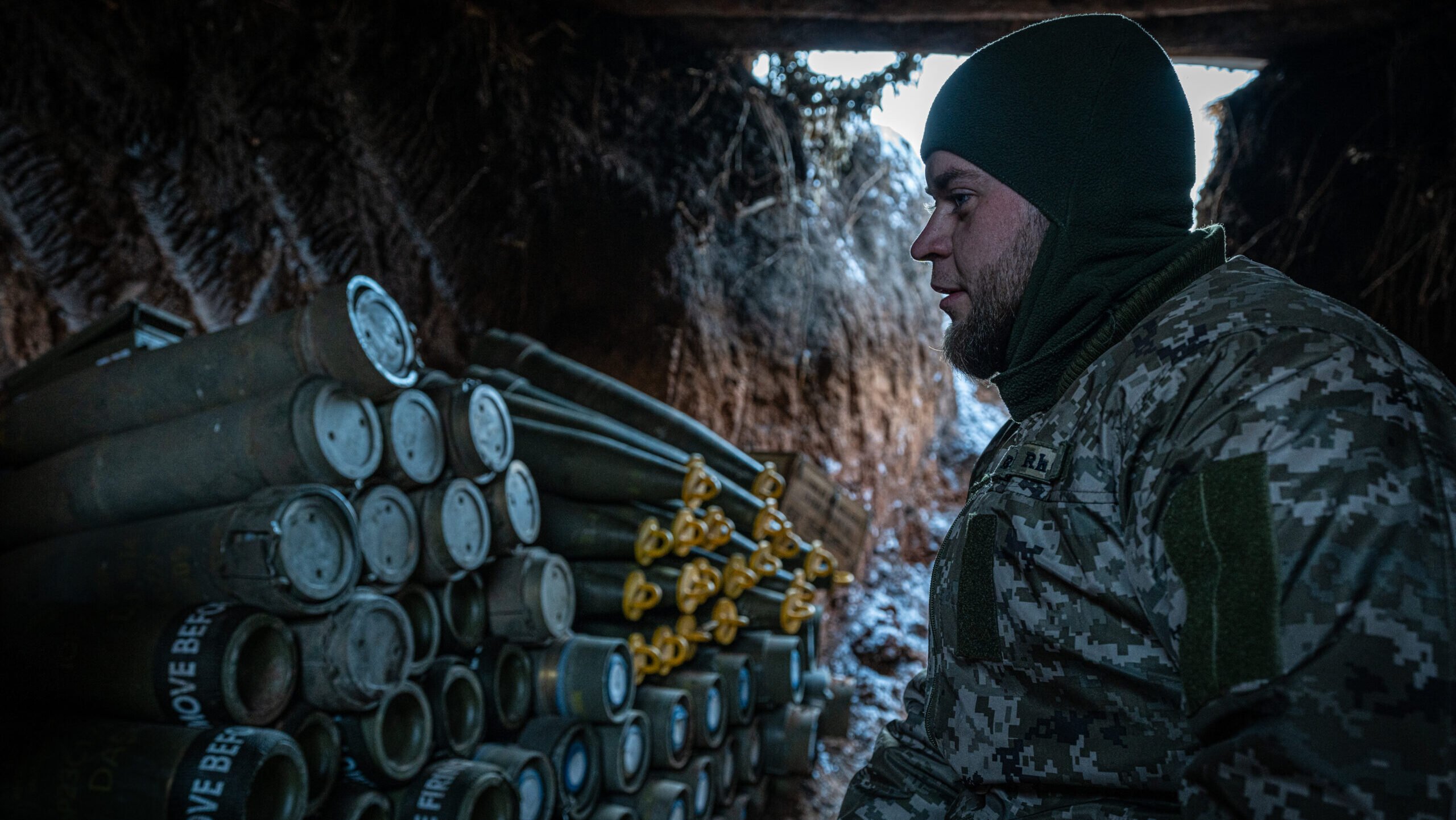
A Ukrainian soldier waits for orders near artillery shells for the M109 artillery self-propelled vehicle on the front line, in the direction of Bakhmut, where clashes between Russia and Ukraine continue to take place, in Donetsk Oblast, Ukraine on January 22, 2024. (Photo by Ignacio Marin/Anadolu via Getty Images)
WASHINGTON — If Congress fails to pass a $105 billion supplemental national security funding bill, the chairman of the Senate’s Armed Services Committee said he could back a fiscal 2025 defense authorization bill that busts the $850 billion spending cap imposed by last year’s debt-ceiling agreement.
Sen. Jack Reed, D-R.I., said his committee would consider “all the different tools” available to potentially raise Defense Department spending past the fiscal 2025 budget request’s $849.5 billion topline if Congress did not act on a supplemental spending request, which is focused on aid for Ukraine and Israel, but which Reed said is “critical” for ensuring the US military is able to replenish munitions and artillery it has already sent to Kyiv.
“Without a supplemental, we’re in sort of unknown country because just keeping our Defense Department operating efficiently and effectively would be potentially jeopardized,” Reed said during a roundtable with reporters today.
RELATED: Ukraine, Israel submarines: What’s in Biden’s $105B supplemental request
Caps set in the Fiscal Responsibility Act constrained the Defense Department’s FY25 budget released last Monday to a 1 percent spending boost — a sum that Pentagon officials said did not fully cover the impact of inflation. At the same time, the $105 billion supplemental requested by the Biden administration in October has stagnated on Capitol Hill amid opposition by House Republicans.
Reed said some lawmakers fail to understand that the supplemental benefits the US military and defense industrial base “as much as the Ukrainians,” as it provides funds needed to replenish US weapons stores and allowing Ukraine to carry on a fight against Russia, a key strategic adversary for the United States.
“The vast majority of the money is going to American companies to produce American equipment that will go to our military, the newest possible equipment to replace that equipment that has been transferred to the Ukrainians,” he said.
Reed, who visited Ukraine in February, said the Ukrainian military needs to be resupplied “immediately,” particularly with artillery shells. While Congress could provide some funding for Ukraine in the FY24 defense appropriations bill set to be released this week, Reed said it would not be sufficient to meet its long-term needs.
“The Ukrainians have to have the confidence that they’re going to have a fairly consistent financial and military support, so they can design their strategy,” he said.
Alongside additional financial support for Ukraine, the supplemental spending bill contains military aid for Israel, including $4 billion available through Sept. 2027 for Israel to procure more Iron Dome and David’s Sling air defense systems, as well as funds for the U.S. submarine industrial base and security assistance in the Indo-Pacific.
RELATED: Israel’s 3 biggest defense companies take stock after 5 months of war
Wading Into Schumer-Netanyahu Controversy
Last week, Senate Majority Leader Chuck Schumer, the most senior Jewish lawmaker in the United States, called for Israeli President Benjamin Netanyahu to hold elections, stating that Netanyahu “no longer fits the needs of Israel.” Netanyahu, who criticized Schumer’s comments as “inappropriate” during a CNN interview on Sunday, has repeatedly reiterated plans to launch an offensive in Rafah, where more than a million Palestinians have sought safe haven.
Reed, who called Schumer’s speech “courageous,” said he agreed that Netanyahu is a “very compromised” political position.
“There are indications that he tolerated, indeed, Hamas as a way to disrupt the Palestinian Authority,” he said, adding that Netanyahu’s administration did not devote the intelligence resources needed to counter Hamas’s build up prior to the Oct. 7 attacks.
“He [Netanyahu] knows that if there’s an election he’ll lose, he also is fearful that unless the courts are reformed — quote unquote — he could very well be put in jail,” Reed said. “He’s operating not as someone whose sole interest I believe is the state of Israel, he has so many competing personal agendas on that.”
At the same time, Reed said he did not think the United States should impose conditions on military aid to Israel if it launches an offensive in Rafah, but must its expectations clear.
“The operation is one that has to be done precisely,” he said. “I think the criticism of the IDF [Israeli Defense Forces] is not that they have gone on the offensive, it’s that they have not done so with the kind of precision and the kind of respect which are required.”
France, Germany ink deal on way ahead for ‘completely new’ future European tank
Defense ministers from both countries hailed progress on industrial workshare for a project that they say “will be a real technological breakthrough in ground combat systems.”

























